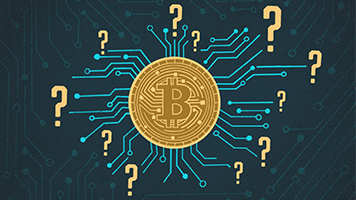What is Blockchain Technology behind Cryptocurrency?
A Blockchain is a decentralized and shared database across computer nodes in the network. A Blockchain acts as a database, storing data in a digital mode.
Blockchains are recognized well for their critical function in keeping a secure and decentralized record of transactions in cryptocurrency platforms like Bitcoin.
The Blockchain ensures the accuracy and security of a data record while also generating trust without the requirement for a trusted party.
The importance of Blockchain
Information is the lifeblood of business. The sooner and more precise it is obtained, the better. Since it delivers instantaneous, shareable, and entirely accessible information kept on an immutable ledger that network users can only view, Blockchain is excellent for providing that information.
A Blockchain network can track Orders, transactions, accounts, output, and others. You could see all facts of a transaction end to end since members share a standard view of the truth, providing you more assurance and additional efficiencies and possibilities.
Blockchain beyond bitcoin and cryptocurrencies
It's essential to conceive Blockchain technology as a form of next-generation business intelligence optimization software from a business standpoint.
Collaborative technology, such as Blockchain, leads to enhanced business procedures between firms, cutting the "cost of trust" dramatically. As a result, it may provide much better returns per dollar invested than most typical internal expenditures.
The Blockchain of Bitcoin is open to the public, which indicates that everyone who holds Bitcoin may see the trading history. By tracing the identity of an account might be challenging, the record displays which accounts are transacting on the Blockchain.
However, not all Blockchains are accessible to the public. Blockchains are private ledger accounts, allowing the Blockchain's owner to control who can make modifications or additions.
The concept of a secure, decentralized perpetual record of data has piqued attention across various sectors. It might provide answers to many of today's security challenges, document methods, and data ownership difficulties.
Blockchain's Future
Blockchain technology allows us to transport information securely and have near-complete assurance about the legitimacy of any piece of data, we wish to safeguard.
NFTs enable sellers to validate the legitimacy of a digital asset because the Blockchain-based record is unchangeable. When you purchase an NFT, the form of your transaction is on the Blockchain becomes a verified record of possession.
For individuals who wish to authenticate the authenticity of a digital piece, Blockchain can allow digital art and collectibles to be valued the same way as their physical equivalents.
In principle, this will enable creators to keep their worth by receiving royalties on interactive digital copies.
Is Blockchain a Safe Investment?
In many ways, Blockchain technology delivers decentralized security and trust. For starters, new blocks always get recorded in sequential and chronological order.
Returning and modifying the content of a union once it appends to the Blockchain's end is difficult, except most of the networks have agreed to do so.
A mathematical function uses digital data into numbers and letters, resulting in hash codes. In case of a change in data in any manner, the hash code will vary as well.
As we approach the third decade of Blockchain, the issue is whether older organizations will adopt the technology but rather when. Today, we are seeing a rise in NFTs and asset tokenization. The next several decades will be a critical phase for Blockchain development.
Related Post

What Are Blockchain Transaction fees?
The blockchain fee is a cryptocurrency's transaction cost that consumers have to pay when they conduct bitcoin transactions. The charge is gathered…
5 Altcoins to make profit in 2022
Acryptocurrency other than Bitcoin is known as an altcoin. Various coins and tokens have emerged as substitutes to Bitcoin, which launched the…
How does bitcoin mining work?
Bmining is the method of putting new bitcoins into circulating; it's also how the network confirms recent transactions, and it's an integral part…
 2022 Insureyourstuff
2022 Insureyourstuff